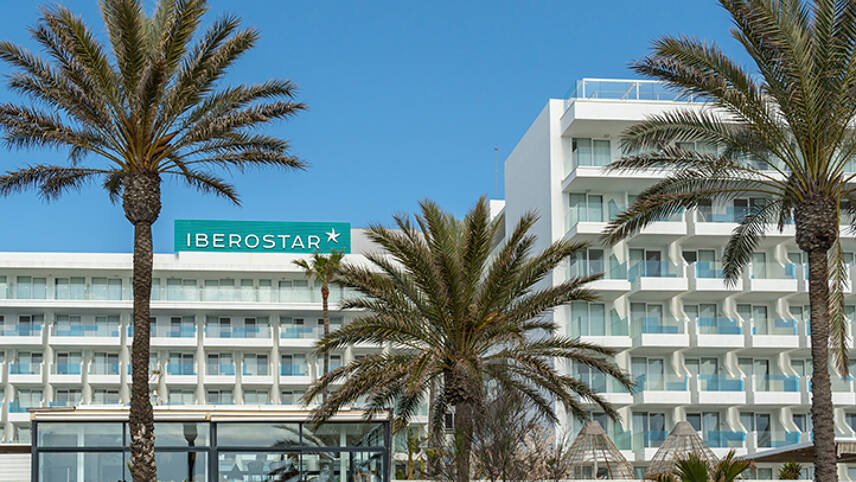This premium content is exclusive to edie Members.
To find out more about edie Membership, please click below.
If you are an existing member, login here

Iberostar hotel in the tourist resort of Playa de Palma, island of Mallorca, Spain
At a glance
Who: The Iberostar Group and Redexis
What: The first hydrogen-based cogeneration fuel cell to be fitted in a hotel
Where: Bahía de Palma hotel, Mallorca, Spain
When: Installation completed September 2023
Why: Reducing the hotel’s dependence on fossil fuels and, thus, its energy-related emissions and exposure to the price crisis
The challenge
The Iberostar Group is targeting carbon-neutral operations by 2030 and has received verification in line with 1.5C from the Science-Based Targets Initiative (SBTi) for its emission reduction targets. This includes an ambition to reduce Scope 2 (power-related) emissions by 85% by 2030, against a 2019 baseline.
Investing in energy efficiency will not be enough. The hotelier has been seeking innovative ways of procuring clean energy – especially for functions which are challenging to electrify, which could deliver up to one-third of the emissions reductions needed.
The solution
Iberostar struct a deal with end-to-end energy infrastructure developer and provider Redexis to install a hydrogen-based cogeneration fuel cell at one of its 100+ hotels.
Green hydrogen, used by running water through electrolyser systems powered by 100% renewable electricity, will be used to fuel the system.
How the project works
The hydrogen fuel cell will be capable of consuming at least 10 tonnes of green hydrogen each year. In doing so, it will produce up to 50 kW of power, which will supply more than 70% of the hotel’s thermal energy. Hotels have high energy needs for heating rooms, water and their pools.
The hotel will also draw some of its electricity from its fuel cell. It already procures 100% renewable electricity through a bespoke tariff matched by renewable guarantee of origin certificates (commonly called RECs in Europe and REGOs in the UK).
Redexis is currently building Spain’s first hydrogen pipeline and is developing several major green and low-carbon hydrogen production projects on Spain’s mainland. It is also a participant in the Green Hysland project on Mallorca. Through this project, companies have jointly pledged €10m to develop a hydrogen ecosystem on Mallorca by 2025, including production, transmission, storage and distribution facilities.
Under its recently announced Energy26 Strategic Plan, Redexis will invest €100m in the Balearic Islands to continue implementing infrastructure that enables the energy transition through to 2026.
Redexis has stated that bringing early-stage green hydrogen projects online in Europe is “essential” to “transforming” how organisations approach the decarbonisation of hard-to-abate activities such as heating.
The results
The fuel cell system was only recently installed and, as such, information on its performance so far is not yet available. Iberostar anticipates that it will cover at least 70% of the hotel’s thermal energy supply and meet a small percentage of its electricity needs, thus reducing its use of fossil fuels and its dependence on the grid.
This will help to shield the hotel from the volatile nature of fossil fuel prices which has been particularly pronounced in Europe over the past two years. The EU is notably aiming to end the use of Russian fossil fuel imports by the late 2020s.
Business benefits
As noted above, Iberostar has not yet disclosed any energy bill savings or carbon reductions resulting from the fuel cell system.
Nonetheless, the system will doubtless earn the business a reputational boost as a green innovator, from environmentally-minded guests and investors alike. It will also help to ensure its voice is heard as low-carbon hydrogen ecosystems are developed on Mallorca and in mainland Spain.
Iberostar has already noted an increase in commercial success since setting out its ‘Wave of Change’ strategy, which includes all of its targets and initiatives relating to responsible tourism. It is notably aiming to protect and restore ecosystems at all of its destinations to offset residual emissions and build climate resilience. At several locations, guests are invited to observe ecosystem conservation and restoration activities, which serves as a unique selling point (USP) for the brand.
Industry context
Bahía de Palma hotel is the first hotel in the world to fit a hydrogen fuel cell. However, due to the energy price crisis – and in pursuit of net-zero targets – many hotel groups are exploring and fitting innovative onsite solutions to reduce their fossil fuel consumption.
2019 saw Premier Inn becoming the first British hotelier to install a battery storage unit. It fitted a 100kW device at its Edinburgh Park location. Two years later, the business invested in a kinetic energy storage system for electric vehicle charging at a hotel in Leipzig, Germany. And, in 2023, it published a detailed net-zero transition plan including the removal of mains gas connections.
Regarding the use of green hydrogen at businesses, adoption to date has proven particularly popular in Europe’s manufacturing sectors, for heating.
Manufacturers with hydrogen in place or preparing to adopt hydrogen include Budweiser Brewing Group, Quorn Foods, Kimberly-Clark, Daimler and Bosch.
All of these businesses are seeking to procure low-carbon hydrogen rather than the fossil-based hydrogen which, at present, accounts for more than 90% of global production. They are, however, calling for further interventions to bring green hydrogen costs down.
The EU is aiming to produce 10 million tonnes of renewable hydrogen by 2030 and to import the same amount of the gas by this point also.
© Faversham House Ltd 2024 edie news articles may be copied or forwarded for individual use only. No other reproduction or distribution is permitted without prior written consent.

